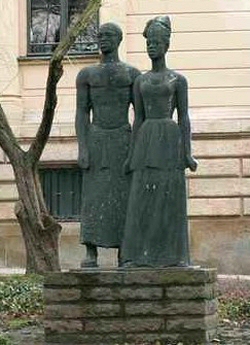You are using an out of date browser. It may not display this or other websites correctly.
You should upgrade or use an alternative browser.
You should upgrade or use an alternative browser.
:dahell: Was the First Non Japanese Samurai?
- Thread starter Doobie Doo
- Start date
More options
Who Replied?Asian culture


I know what class I'm playing when For Honor comes out
MaccabeanRebel
All Star

Black people are the most interesting people in existence... Pervasive throughout all cultures, we own everything we step foot in.
 kenshin aint got shyt on yusuke
kenshin aint got shyt on yusukeBlack Cobain
Donkey Punch? I Donkey Slap!
Black people are the most interesting people in existence... Pervasive throughout all cultures, we own everything we step foot in.
We've been everywhere

Mind if I add a few?
Anton Wilhelm Amo -- Ghana, Germany (1703-1753)

Anton Wilhelm Amo, also known as Antonius Guilielmus Amo Afer ab Aximo in Guinea, was the first intellectual of African ancestry to study in Germany. He obtained a doctorate degree in philosophy and held lectures at the universities of Halle and Jena. Having spent forty years of his life in Germany, Amo returned to his place of birth where he died after 1753.
For reasons unknown, he left Halle to continue his studies at the University of Wittenberg where he defended his dissertation “De humanae mantis apatheia” (On Apathy in the Human Mind) in 1734 and was awarded a doctorate degree. Two years later, Amo was back in Halle and held lectures on philosophical topics, some of them published in his main work, the “Tractatus de arte sobrie et accuarate philosophandi”, a book on logic and psychology of knowledge.
Malik Ambar -- Ethiopia, India (1548-1626)

Malik Ambar was born in the city of Alhura in a Habshi tribe of Maya, the capital of the Adal Sultanate, in modern eastern Ethiopia. However, some sources mention the Ethiopian town of Harar as his birthplace. Both the Solomonic dynasty and the Adal sultanate were devastated after two decades of war with each other. According to the Futuhat-i `adil Shahi, Malik Ambar then known as Shambhu or Shan-bu was sold into slavery by his parents.
He ended up in al-Mukha in Yemen, where he was sold again for 20 ducats and was taken to the slave market in Baghdad, where he was sold a third time to the Qadi al-Qudat of Mecca and again in Baghdad to Mir Qasim al-Baghdadi, who eventually took him to south-central India.
In time he created an independent army, a mercenary force numbering up to 1500 men. It was based in the Deccan region and was hired by local kings. Malik Ambar was the regent of the Nizamshahi dynasty of Ahmednagar from 1607 to 1626. In 1612, Malik Ambar was recorded as the first ruler to use rockets as military weapon when he came into conflict against the Mughals
Malik Ambar is especially famous for the Nahr, the canal water supply system of the city called Khadki now known as Aurangabad. Malik Ambar completed the Neher within fifteen months, spending a nominal sum of two and a half lakh Rupiyahs. This city is situated on the banks of Kham, a small perennial stream which takes its rise in the neighbouring hills.
Abram Petrovich Gannibal (1696-1781) Cameroon, Russia
Abram Petrovich[a] Gannibal, also Hannibal or Ganibal, or Abram Hannibal or Abram Petrov (Russian: Абра́м Петро́вич Ганниба́л; 1696 – 14 May[1] 1781), was an Afro-Russian nobleman, military engineer and general. Kidnapped as a child and presented as a gift to Peter the Great, he was raised in the Emperor's court household as his godson.[2] Gannibal eventually rose to become a prominent member of the imperial court in the reign of Peter's daughter Elizabeth. He is a great-grandfather of the author and poet Alexander Pushkin.
In 1717, Gannibal was taken to Metz to continue an education in the arts, sciences and warfare. By then he was fluent in several languages and excelled in mathematics and geometry. In 1718 Gannibal joined the French Army with hopes of pleasing his godfather by expanding his military engineering education.[7] Gannibal enrolled in the royal artillery academy at La Fère in 1720, and he fought for Louis XV of France against Louis' uncle Philip V of Spain, rising to the rank of captain. It was during his time in France that Gannibal adopted his surname in honor of the Carthaginian general Hannibal.
Gannibal returned to Metz to further his education at a new artillery school.[7] In Paris he met and befriended such Enlightenment figures as the Baron de Montesquieu and Voltaire (this claim by his biographer Hugh Barnes is disputed by reviewer Andrew Kahn.[9]). Voltaire called Gannibal the "dark star of the Enlightenment".
Alexander Pushkin used his great-grandfather Abram Gannibal as the model for Ibrahim, the lead character in his unfinished novel Peter the Great's Negro. Pushkin spoke often about his African heritage, and how he had suffered racist taunts about his own appearance.